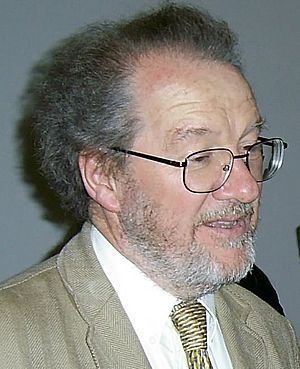Alex Wilkie facts for kids
Quick facts for kids
Alex Wilkie
|
|
|---|---|

Wilkie, pictured in 2007
|
|
| Born |
Alex James Wilkie
1948 (age 77–78) Northampton, England
|
| Nationality | British |
| Alma mater | University College London Bedford College, University of London |
| Known for | Wilkie's theorem |
| Awards | Karp Prize (1993) Fellow of the Royal Society (2001) Pólya Prize (LMS) (2017) |
| Scientific career | |
| Fields | Mathematics, Model theory |
| Institutions | University of Manchester |
| Doctoral advisor | Wilfrid Hodges |
Alex James Wilkie is a famous British mathematician. He was born in Northampton, England, in 1948. He is well-known for his important work in model theory and logic.
Before joining the University of Manchester, he was a Reader in Mathematical Logic at the University of Oxford. In 2007, he became the Fielden Chair of Pure Mathematics at the University of Manchester.
Contents
Early Life and Education
Alex Wilkie attended Aylesbury Grammar School when he was younger. He then went on to study mathematics at university.
University Studies
He earned his first degree, a BSc, from University College London in 1969. He got top grades, known as first class honours. In 1970, he received his MSc in mathematical logic from the University of London.
Doctoral Research
He completed his PhD in 1973 at Bedford College, University of London. His supervisor was Wilfrid Hodges. His PhD paper was about "Models of Number Theory."
Career and Key Discoveries
After finishing his PhD, Alex Wilkie began his career as a mathematics lecturer. He worked at Leicester University from 1972 to 1973. Then, he was a research fellow at the Open University until 1978.
Working at Oxford and Yale
He spent two periods as a junior lecturer at Oxford University. These were from 1978 to 1980 and again from 1981 to 1982. In between, from 1980 to 1981, he was a visiting assistant professor at Yale University in the United States.
Solving Tarski's Problem
In 1980, Alex Wilkie solved a very difficult math problem. It was called Tarski's high school algebra problem. This was a big achievement in his field.
Return to Manchester and Oxford
In October 1982, Wilkie became a research fellow at the University of Paris VII. The next year, he returned to England. He took a special research fellowship at the University of Manchester for three years. After two years, he became a lecturer in the Department of Mathematics there.
In 1986, he moved back to Oxford University. He became the Reader in Mathematical Logic, taking over from Robin Gandy. He stayed in this important role until he moved back to Manchester in 2007.
Awards and Special Recognition
Alex Wilkie has received many awards for his contributions to mathematics. These awards show how important his work is.
Fellow of the Royal Society
In 2001, he was chosen as a Fellow of the Royal Society (FRS). This is a very high honor for scientists in the UK. The Royal Society recognized his work combining logic and geometry. His findings helped understand complex mathematical functions.
Karp Prize and Other Honors
He received the Carol Karp Prize in 1993. This is the highest award given by the Association for Symbolic Logic. He shared this prize with Ehud Hrushovski.
He was elected to the Council of the London Mathematical Society in 2007. He also served as vice-president (2006) and president (2009) of the Association for Symbolic Logic. In 2012, he became a fellow of the American Mathematical Society. He received the Karp Prize again in 2013, sharing it with several other mathematicians. In 2017, he was awarded the Pólya Prize.
Invited Speaker
He was invited to speak at the International Congress of Mathematicians twice. These were in Berkeley in 1986 and in Berlin in 1998. In 2015, he gave the Gödel Lecture, a very prestigious talk in logic.
 | Victor J. Glover |
 | Yvonne Cagle |
 | Jeanette Epps |
 | Bernard A. Harris Jr. |

